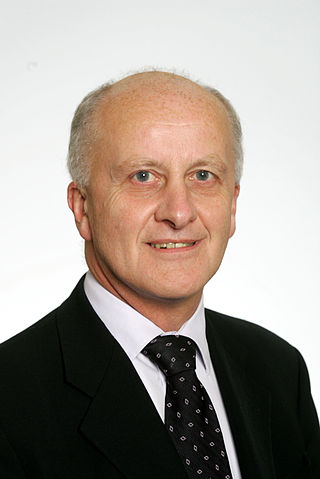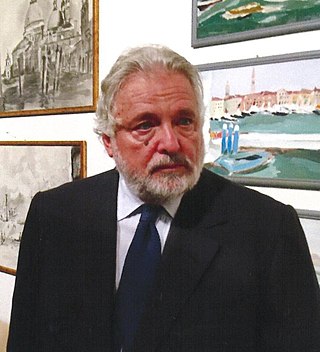
The United Nations Environment Programme (UNEP) is responsible for coordinating responses to environmental issues within the United Nations system. It was established by Maurice Strong, its first director, after the United Nations Conference on the Human Environment in Stockholm in June 1972. Its mandate is to provide leadership, deliver science and develop solutions on a wide range of issues, including climate change, the management of marine and terrestrial ecosystems, and green economic development. The organization also develops international environmental agreements; publishes and promotes environmental science and helps national governments achieve environmental targets.

The United Nations Industrial Development Organization (UNIDO) is a specialized agency of the United Nations that assists countries in economic and industrial development. It is headquartered at the UN Office in Vienna, Austria, with a permanent presence in over 60 countries. As of April 2019, UNIDO comprises 170 member states, which together set the organization's policies, programs, and principles through the biannual General Conference.

A hydrogen vehicle is a vehicle that uses hydrogen fuel for motive power. Hydrogen vehicles include road vehicles, rail vehicles and hydrogen-fueled space rockets, as well as hydrogen-powered ships and aircraft. Motive power is generated by converting the chemical energy of hydrogen to mechanical energy, either by reacting hydrogen with oxygen in a fuel cell to power electric motors or, less commonly, by hydrogen internal combustion.

An eco-industrial park (EIP) is an industrial park in which businesses cooperate with each other and with the local community in an attempt to reduce waste and pollution, efficiently share resources, and help achieve sustainable development, with the intention of increasing economic gains and improving environmental quality. An EIP may also be planned, designed, and built in such a way that it makes it easier for businesses to co-operate, and that results in a more financially sound, environmentally friendly project for the developer.

The hydrogen economy is an umbrella term that draws together the roles hydrogen can play alongside renewable electricity to decarbonize those sectors and activities which may be technically difficult to decarbonize through other means, or where cheaper and more energy-efficient clean solutions are not available. In this context, hydrogen economy encompasses hydrogen's production through to end-uses in ways that substantively contribute to avoiding the use of fossil fuels and mitigating greenhouse gas emissions.
The Fuel Cell Bus Club comprised the participants of three demonstration projects for fuel cell buses in nine European cities and two other worldwide cities between 2001 and 2007. The Fuel Cell Bus Club became a forum to share experiences and information between cities and researchers. Other cities such as Beijing also tested buses from the consortium behind the project.

The Organization of the Black Sea Economic Cooperation (BSEC) is a regional international organization focusing on multilateral political and economic initiatives aimed at fostering cooperation, peace, stability and prosperity in the Black Sea region. It traces its origin to 25 June 1992, when Turkish President Turgut Özal and leaders of ten other countries gathered in Istanbul and signed the Summit Declaration and the "Bosphorus Statement". BSEC Headquarters – the Permanent International Secretariat of the Organization of the Black Sea Economic Cooperation – was established in March 1994, also in Istanbul.
Cleaner production is a preventive, company-specific environmental protection initiative. It is intended to minimize waste and emissions and maximize product output. By analysing the flow of materials and energy in a company, one tries to identify options to minimize waste and emissions out of industrial processes through source reduction strategies. Improvements of organisation and technology help to reduce or suggest better choices in use of materials and energy, and to avoid waste, waste water generation, and gaseous emissions, and also waste heat and noise.

Iceland is a world leader in renewable energy. 100% of Iceland's electricity grid is produced from renewable resources. In terms of total energy supply, 85% of the total primary energy supply in Iceland is derived from domestically produced renewable energy sources. Geothermal energy provided about 65% of primary energy in 2016, the share of hydropower was 20%, and the share of fossil fuels was 15%.
The United Nations Sustainable Development Group (UNSDG), previously the United Nations Development Group (UNDG), is a consortium of 36 United Nations funds, programmes, specialized agencies, departments and offices that play a role in development. It was created by the Secretary-General of the United Nations in order to improve the effectiveness of United Nations development activities at the country level.

Energy laws govern the use and taxation of energy, both renewable and non-renewable. These laws are the primary authorities related to energy. In contrast, energy policy refers to the policy and politics of energy.
The milestones for carbon capture and storage show the lack of commercial scale development and implementation of CCS over the years since the first carbon tax was imposed.
The Gulf Organization for Industrial Consulting (GOIC) is a market research organization headquartered in Doha, Qatar whose activities involve preparing economic feasibility studies, researching socio-economic statistics and promoting regional co-ordination between industrial institutions.

Prof John Neil Loughhead CB OBE FREng FIMechE FIET is a British businessman and Chief Scientific Adviser to Department for Business, Energy and Industrial Strategy (BEIS). He is also a Fellow of the Royal Academy of Engineering, Chair of the Energy research partnership and was formerly the Executive Director of the UK Energy Research Centre. He was appointed an OBE for services to Technology in 2011. In 2014, he was voted as one of the Top 500 Most Influential People in Britain by Debrett's and The Sunday Times.
Turhan Nejat Veziroğlu, sometimes referred to as TN Veziroglu, is a professor emeritus at the University of Miami, and during the 1970s chaired its mechanical engineering department and was its associate dean for research. He is the President of the International Association for Hydrogen Energy and founding editor of the International Journal of Hydrogen Energy. A research center at the University of Niğde, Turkey carries his name.
The Organization for International Economic Relations (OiER) is a global non-profit, non-governmental organization based in Vienna, Austria. It is a network that focuses on building partnerships and identifying trends in a global context and addressing key future-oriented issues in areas of sustainability, innovation, communication, environment, energy and mobility.

Giorgio Rosso Cicogna is an Italian diplomat and international official born in Trieste on May 7, 1945.
Rose Mwebaza is a Ugandan lawyer who serves as the United Nations Environment Program's regional office for Africa since 2023. She is the Director of the Climate Technology Centre & Network (CTCN), the implementation arm of the UN Framework Convention on Climate Change (UNFCCC) Technology Mechanism, which is hosted and managed by the United Nations Industrial Development Organization (UNIDO) and the UN Environment Programme. Mwebaza also serves as the Advisory Board Secretary UNFCCC.










